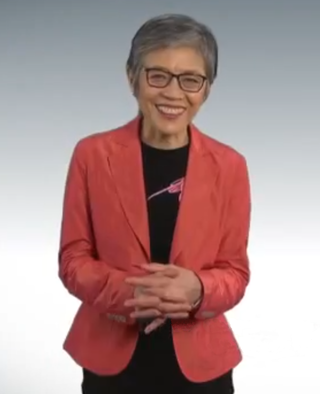Related Research Articles
Karen K. Hsiao Ashe is a professor at the Department of Neurology and Neuroscience at the University of Minnesota (UMN) Medical School, where she holds the Edmund Wallace and Anne Marie Tulloch Chairs in Neurology and Neuroscience. She is the founding director of the N. Bud Grossman Center for Memory Research and Care, and her specific research interest is memory loss resulting from Alzheimer's disease and related dementias. Her research has included the development of an animal model of Alzheimer's.
Sir John Anthony Hardy is a human geneticist and molecular biologist at the Reta Lila Weston Institute of Neurological Studies at University College London with research interests in neurological diseases.
Bart De Strooper is a Belgian molecular biologist and professor at Vlaams Instituut voor Biotechnologie and KU Leuven and the UK Dementia Research Institute and University College London, UK. De Strooper's research seeks to translate genetic data into the identification and treatment of neurodegenerative diseases and treatments. interest are the secretases, proteases which cleave the amyloid precursor protein (APP), resulting in amyloid peptides.
John Quinn Trojanowski was an American academic research neuroscientist specializing in neurodegeneration. He and his partner, Virginia Man-Yee Lee, MBA, Ph.D., are noted for identifying the roles of three proteins in neurodegenerative diseases: tau in Alzheimer's disease, alpha-synuclein in Parkinson's disease, and TDP-43 in Amyotrophic Lateral Sclerosis (ALS) and frontotemporal degeneration.
Geriatric neurology is the branch of medicine that studies neurologic disorders in elderly.
Peter Davies was a Welsh scientist and active researcher. He was the head and director of the Litwin-Zucker Research Center for The Study of Alzheimer's disease and memory disorders, associated with the Feinstein Institute for Medical Research in Manhasset, New York, US.

Karen Elizabeth Keitley Duff is a British scientist known for her work on Alzheimer's disease. Her most notable work focused on the development and characterization of mouse models of Alzheimer's disease amyloid deposition. She became Centre Director of the UK Dementia Research Institute's hub at University College London in spring 2020.

Kristine Yaffe is an American Cognitive decline and dementia researcher. She is the Scola Endowed Chair and Vice Chair and Professor of Psychiatry, Neurology and Epidemiology and the Director of the Center for Population Brain Health at the University of California, San Francisco. In 2019, Yaffe was elected to the National Academy of Medicine.

Vladimir Hachinski is a Canadian clinical neuroscientist and researcher based at the Schulich School of Medicine and Dentistry at Western University. He is also a Senior Scientist at London's Robarts Research Institute. His research pertains in the greatest part to stroke and dementia, the interactions between them and their joint prevention through holistic brain health promotion. He and John W. Norris helped to establish the world's first successful stroke unit at Sunnybrook Hospital in Toronto, and, by extension, helped cement stroke units as the standard of care for stroke patients everywhere. He discovered that the control of the heart by the brain is asymmetric, the fight/flight (sympathetic) response being controlled by the right hemisphere and the rest and digest (parasympathetic) response being controlled by the left hemisphere and damage to one key component can lead to heart irregularities and sudden death. This discovery has added fundamental knowledge to how the brain controls the heart and blood pressure and lays the foundation for helping prevent sudden death.

Virginia Man-Yee Lee is a Chinese-born American biochemist and neuroscientist who specializes in the research of Alzheimer's disease. She is the current John H. Ware 3rd Endowed Professor in Alzheimer's Research at the Department of Pathology and Laboratory Medicine, and the director of the Center for Neurodegenerative Disease Research and co-director of the Marian S. Ware Alzheimer Drug Discovery Program at the Perelman School of Medicine, University of Pennsylvania. She received the 2020 Breakthrough Prize in Life Sciences.
Konrad Beyreuther is a German molecular biologist and chemist known for his work on neurodegenerative diseases.
Eva-Maria Mandelkow is a German neuroscientist and Alzheimer's disease researcher at the German Center for Neurodegenerative Diseases (DZNE), Bonn.
Alison Mary Goate is a professor of neuroscience and Director of the Loeb Center for Alzheimer's Disease at Icahn School of Medicine at Mount Sinai, New York City. She was previously professor of genetics in psychiatry, professor of genetics, and professor of neurology at Washington University School of Medicine.
Bryan J. Traynor is a neurologist and a senior investigator at the National Institute on Aging, and an adjunct professor at Johns Hopkins University. Dr. Traynor studies the genetics of human neurological conditions such as amyotrophic lateral sclerosis (ALS) and frontotemporal dementia (FTD). He led the international consortium that identified pathogenic repeat expansions in the C9orf72 gene as a common cause of ALS and FTD. Dr. Traynor also led efforts that identified other Mendelian genes responsible for familial ALS and dementia, including VCP, MATR3, KIF5A, HTT, and SPTLC1.
Rosa Rademakers is a Dutch neurogeneticist and professor within the Department of Neuroscience at the Mayo Clinic. Her research centers on the genetic basis of neurodegenerative diseases, such as identifying causal genes and their function, exploring familial risk factors, and the mechanism of the degeneration. Her neurodegenerative diseases of focus include "Alzheimer's disease (AD), frontotemporal dementia (FTD) and amyotrophic lateral sclerosis (ALS)." She received a Bachelor of Arts in Biology, a Master of Arts in Biochemistry, and a Ph.D. in Science, all from the University of Antwerp. Originally from the Netherlands, she came to the Mayo Clinic in 2005 for a post-doctoral fellowship, and in 2007 she was given a lab director position.
Constantine G. Lyketsos is the Elizabeth Plank Althouse Professor in Alzheimer's Disease Research in the Department of Psychiatry and Behavioral Sciences at the Johns Hopkins University, Baltimore, Maryland, United States. He is the founding director of the Richman Family Precision Medicine Center of Excellence in Alzheimer's Disease, and an associate director of the Johns Hopkins Alzheimer's Disease Research Center (ADRC).
Dennis J. Selkoe is an American physician (neurologist) known for his research into the molecular basis of Alzheimer's disease. In 1985 he became Co-Director of the Center for Neurological Diseases and from 1990, Vincent and Stella Coates Professor of Neurological Diseases at Harvard Medical School. He is also a Fellow of the AAAS and a member of the National Academy of Medicine.
Claudia H. Kawas is an American neurologist. As the Al and Trish Nichols Chair in clinical neurology at the University of California, Irvine, Kawas established the Leisure World Cohort Study to monitor the health and well-being of people 90 and older in Laguna Woods, California.
Gerard David Schellenberg is an academic neuropathologist who specializes in the research of Alzheimer's disease. He is the director of Penn Neurodegeneration Genomics Center as well as a professor of Pathology and Laboratory Medicine at the University of Pennsylvania. He is a leading contributor to Alzheimer's disease research.
David A Bennett is a neurologist, Director of the Rush Alzheimer's Disease Center (RADC), and the Robert C Borwell Professor of Neurology at Rush University Medical Center.Bennett is also Visiting Professor, Instituto de Assistencia Medica ao Servidor Publico Estadual (IAMSPE), São Paulo, Brazil.
References
- ↑ "Potamkin Prize for Research in Pick's, Alzheimer's, and Related Diseases". American Academy of Neurology. Archived from the original on 7 September 2015. Retrieved 24 June 2015.
- ↑ "About The Potamkin Prize". The Potamkin Prize. Retrieved 2020-04-24.
- ↑ "Past Recipients". The Potamkin Prize. Retrieved 2020-04-24.
- ↑ "Apply or Nominate". The Potamkin Prize. Retrieved 2020-04-24.
- ↑ "POTAMKIN PRIZE FOR RESEARCH IN PICK'S, ALZHEIMER'S, AND RELATED DISEA". American Academy of Neurology . Archived from the original on 2017-09-23.
- ↑ "Research". American Academy of Neurology. Retrieved 4 October 2019.